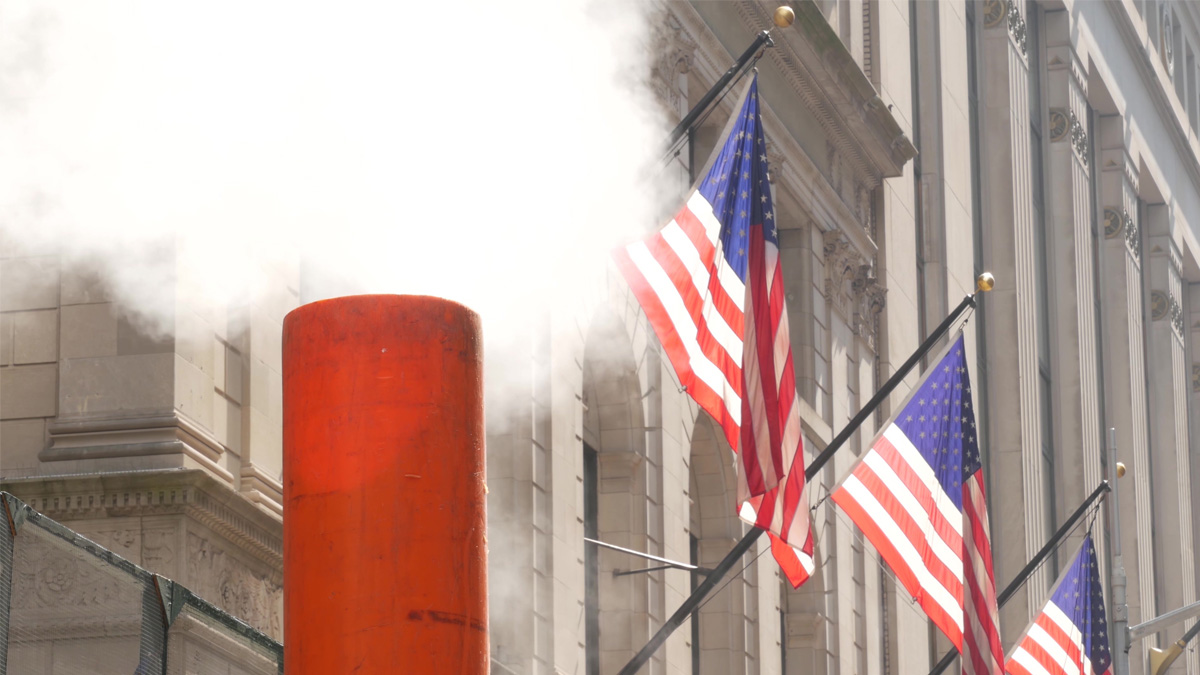Jaguar’s rebrand: The claws are out
Plus, all the news you need to know this week, why it's sometimes good to be wrong and why the middle of Lidl has a "big male following".
This week, Jaguar Land Rover revealed a new look and branding for Jaguar. It is fair to say it has caused a stir. This is the new logo:
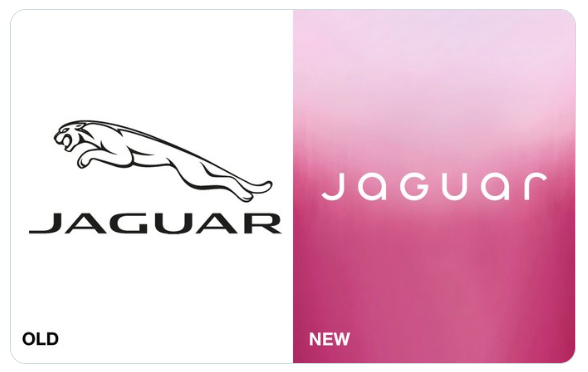
And it’s new ad campaign.
There has been a mixed reaction, to put it mildly. These were some of the headlines. The Times:

The Daily Mail:
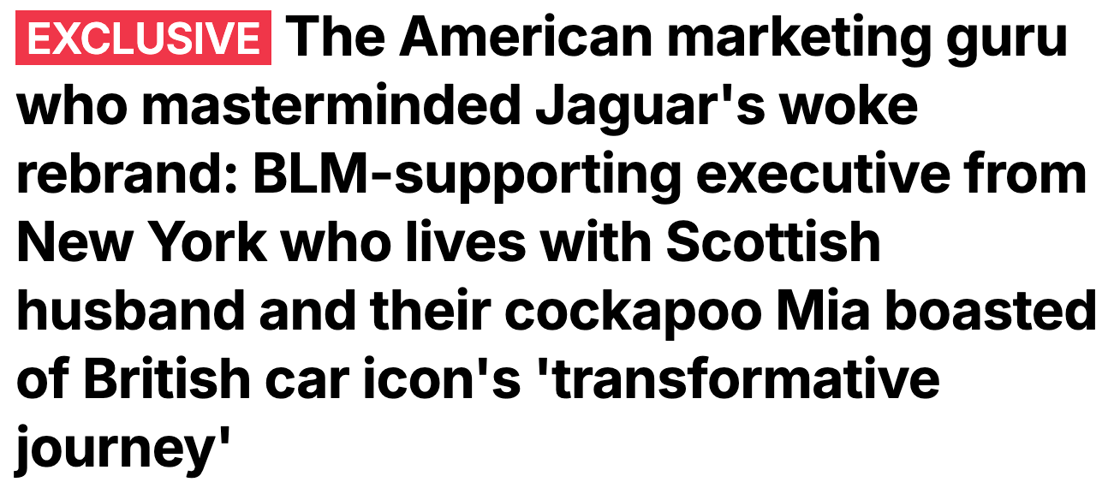
And the Financial Times:

In the FT story, Rawdon Glover, the managing director of Jaguar, said: “If we play in the same way that everybody else does, we’ll just get drowned out. So, we shouldn’t turn up like an auto brand. We need to re-establish our brand and at a completely different price point, so we need to act differently. We wanted to move away from traditional automotive stereotypes.”
You can read that interview here.
The new branding is designed to highlight Jaguar’s switch to all-electric vehicles. The slogan for the new branding is “Copy nothing”. Nothing is also the name of a UK tech company that makes minimalistic mobile phones. Nothing had its own response to the Jaguar rebranding…

Social media has been ablaze all week with reaction and analysis to the branding. The one person I wanted to hear from was Rory Sutherland, the vice-chairman of Ogilvy and a veteran of the advertising industry. Sutherland has reinvented himself as a TikTok star by offering insights on advertising, but he is holding back on this rebranding for now…
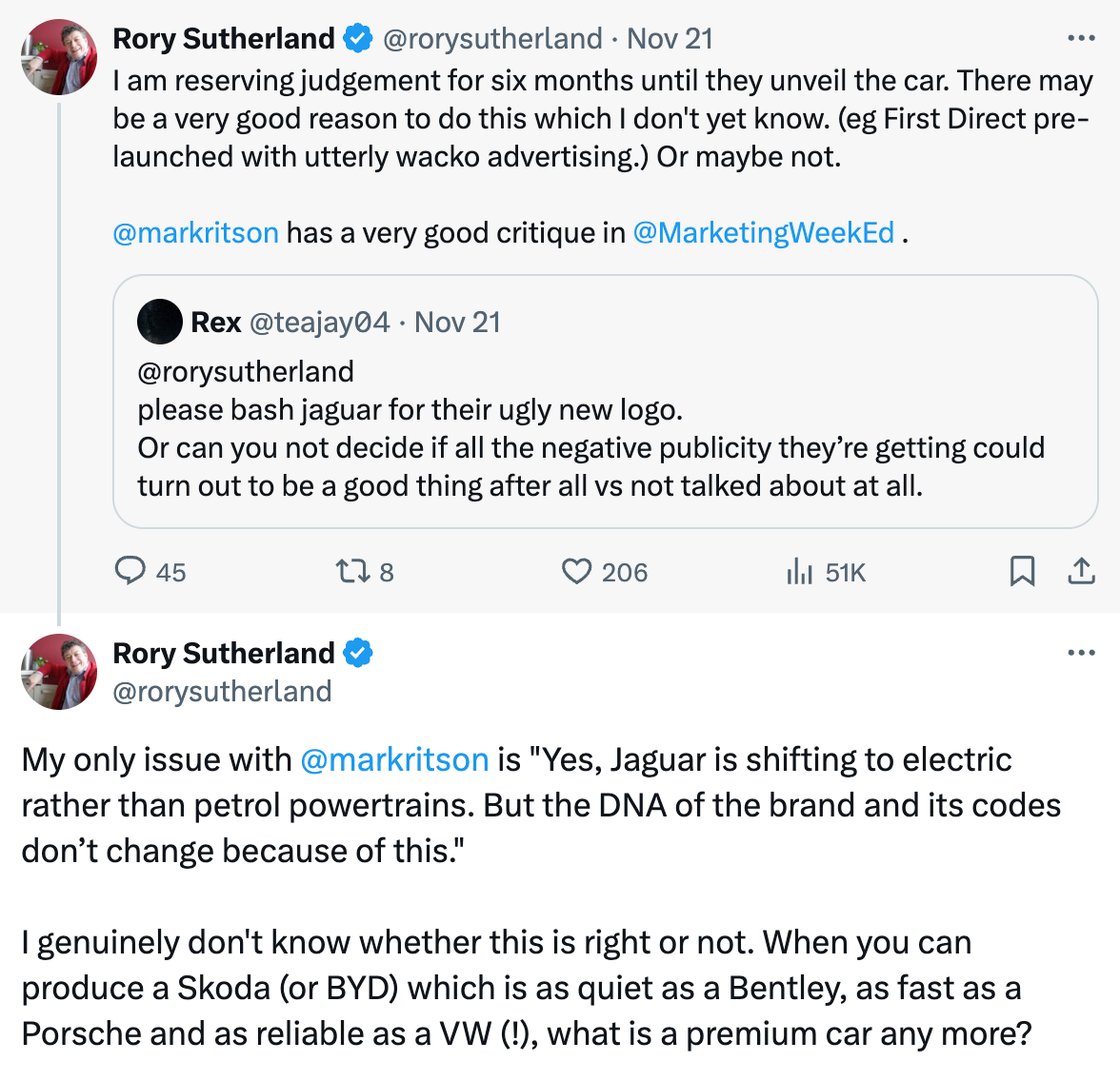
However, others weren’t prepared to wait…
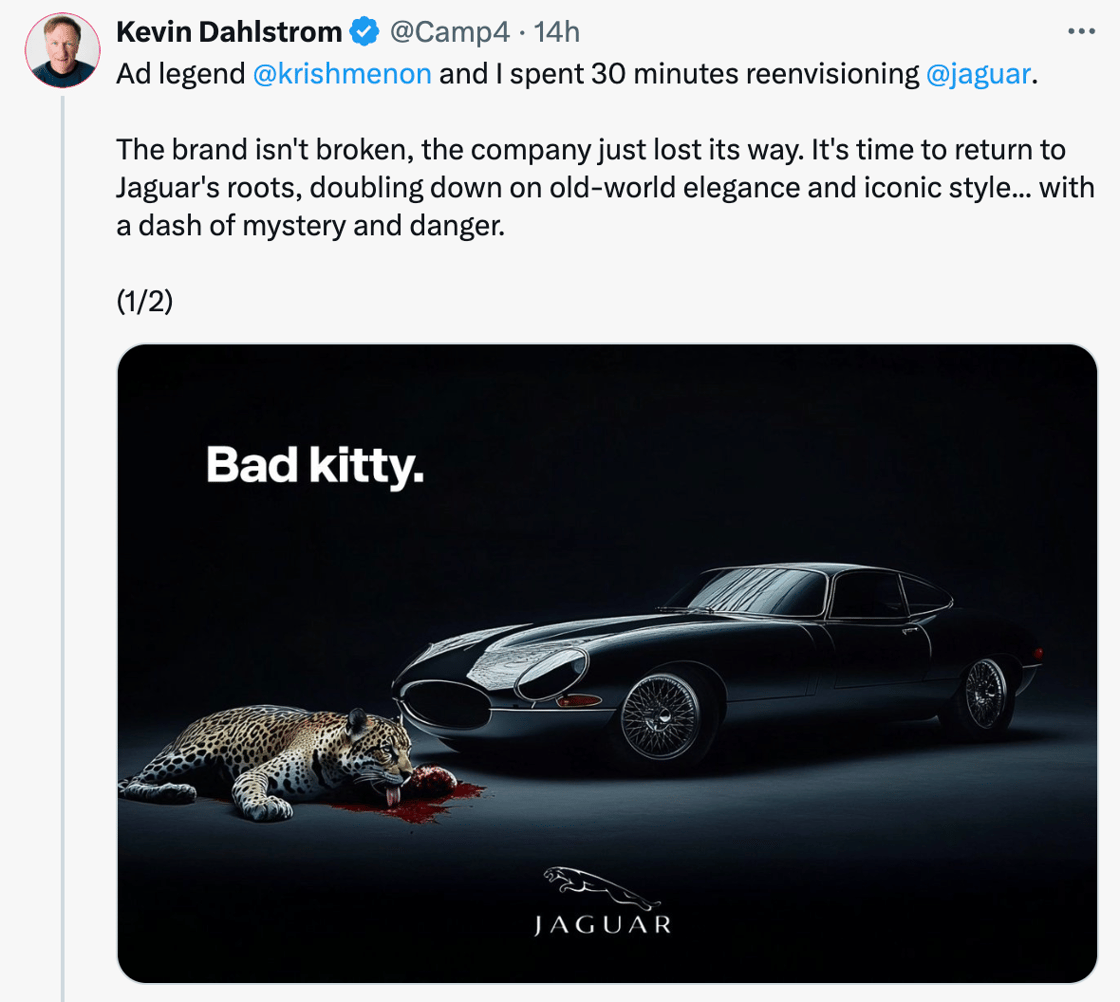
Although there were those supporting it too…
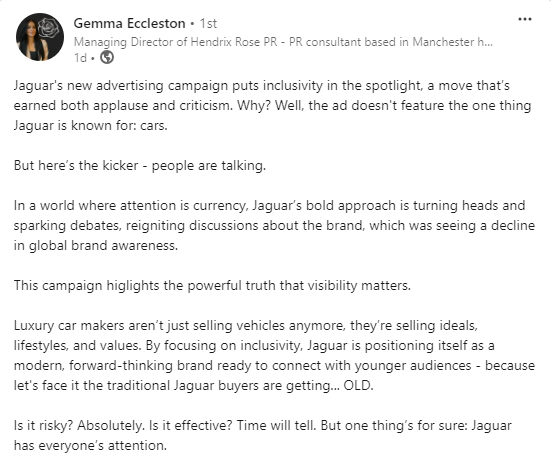
Some context on this debate is important. Jaguar has a lot of work to do as a brand. Those who are bemoaning the change or wishing for the brand to return to its roots should be aware that only 15,510 Jaguar cars have been sold in the UK so far this year, according to the latest data from the Society of Motor Manufacturers and Traders.
This article is an online version of our Weekend newsletter. Sign up to receive it straight to your inbox.
To put that into context, it is just 0.72 per cent of the UK market. It compares to sales of 141,835 for Volkswagen, the industry leader, and is well below the German luxury brands such as Mercedes-Benz, which is at 88,375, and even companies like Dacia, Cupra and Mazda. Land Rover, Jaguar’s sister brand, is far bigger, with 52,828 vehicles sold in the UK so far this year.
This is replicated globally. Jaguar Land Rover, which is owned by Indian company Tata Motors, sold 431,733 vehicles in the last financial year. Just 66,866 of those – or 15 percent – were Jaguars. In other words, the apparent love for the previous Jaguar brand is not backed up by people willing to spend money on it. Love it or loathe this rebrand, at least it has got people talking about Jaguar again
What you need to know this week
1. UK inflation edged higher to 2.3 per cent in October as energy costs rose, with forecasts warning it could surpass 3 per cent next year. The unexpected uptick heaps pressure on the Bank of England to delay further interest rate cuts amid concerns over persistent wage pressures and economic uncertainty. Read more here.
2. The fallout from the Budget has continued with a number of companies speaking out about the ramifications of Rachel Reeves’s inaugural fiscal address. Royal Mail’s parent company has warned that it will set aside £134m, with £120m directly linked to the employer national insurance contributions hike. HMV and John Lewis have also joined the chorus warning about its impact.
3. Nvidia posted a 94 per cent revenue surge to $35.1bn for the quarter ending October, beating analyst expectations and showcasing the chipmaker’s pivotal role in the AI revolution. Despite overheating concerns with its new Blackwell chips, demand remains robust, with data centre revenue up 112 per cent year on year to $30.8bn. Read more here.
4. Retail sales volumes fell by 0.7 per cent in October, reversing a modest rise in September, as shoppers curtailed spending amid uncertainty over Labour’s tax-raising Budget. The decline, steeper than economists’ forecasts, was driven by drops in clothing, footwear and non-food sales, raising concerns about fading economic momentum at the start of the final quarter. Despite the setback, economists remain cautiously optimistic about a year-end boost from Black Friday and holiday shopping. Read more here.
5. Bitcoin’s value hit a record high of $98,831 (£79,000). The rise in value has been driven by the landmark debut of Bitcoin ETF options, which are bridging traditional finance with digital assets. The rally, bolstered by broader investor adoption, has energised the entire cryptocurrency market with major altcoins like Ether and Solana also posting gains. Analysts suggest the $100,000 milestone is within reach, underscoring Bitcoin’s growing influence in global finance. Read more here.
Join Business Leader
Business Leader is a membership organisation for the founders and CEOs of mid-size businesses. We want to help you grow your business faster by supporting you to better understand the drivers of success and failure.
Membership includes:
- Eight peer-to-peer forums
- Personalised guidance from a coach
- Access to a nationwide network of leaders
- Online and in-person masterclasses
- Under the Bonnet company visits
- An invite to our annual Summit
- Exclusive member content
Weekend reading
🎓The business school scandal that keeps getting bigger
A major academic fraud scandal has rocked elite business schools, implicating Harvard’s Francesca Gino in data fabrication across multiple studies. The revelations have cast doubt on an entire field, jeopardising collaborators like UC Berkeley’s Juliana Schroeder, who launched an unprecedented audit of Gino’s research. While Schroeder sought to restore trust, her investigation uncovered deeper issues, with fraudulent data appearing in studies beyond Gino’s involvement. As the fallout spreads, the credibility of business-school research – known for its popular appeal and lucrative rewards – is under intense scrutiny.
❌ Why being wrong is good for you
Mistakes can lead to fortune or humiliation, as history and business remind us. From Lee Kum Sheung’s accidental creation of oyster sauce to Amazon’s Fire Phone flop, failure often marks the path to growth. Whether for individuals or companies, success hinges on recognising errors, learning from them and fostering a culture that turns missteps into opportunities.
📈 ‘Happy hour in reverse’: where dynamic pricing may creep further
Dynamic pricing, where costs fluctuate based on demand, is spreading beyond flights and ride-hailing apps into pubs, theme parks and even energy bills. While critics decry it as opportunistic, supporters argue it’s simply market economics in action. As AI enables real-time adjustments, this controversial model could soon shape the way we pay for everything.
And finally
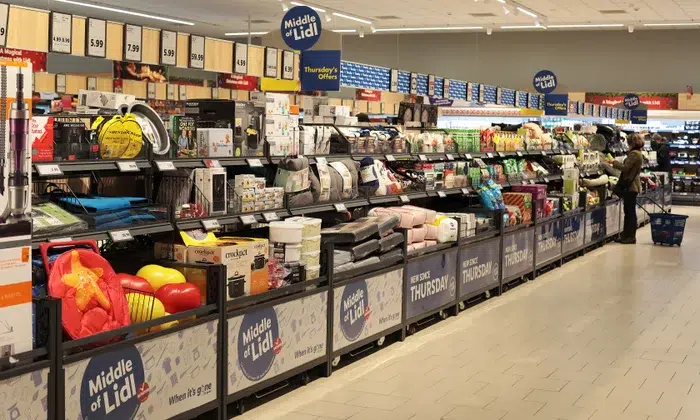
The middle of Lidl is a magical place… for men, according to the retailer’s UK boss. Ryan McDonnell has spoken to the BBC about what is quickly becoming a cultural phenomenon. And, he says, it has “a big male following”
“There are some interesting shopping habits in this aisle,” he said, adding he had known rows between couples after a man had become “intrigued by a gadget or two”.
“I would say there are a lot of men in trouble when they come in here,” he added.
There are Facebook pages, Reddit threads and YouTube videos dedicated to middle-aisle finds.
“My mum came back with a two-man canoe despite not living near any suitable body of water,” one Reddit user posted on a thread about things people had found. “A flamethrower,” another user posted. “It was for getting rid of weeds.”



